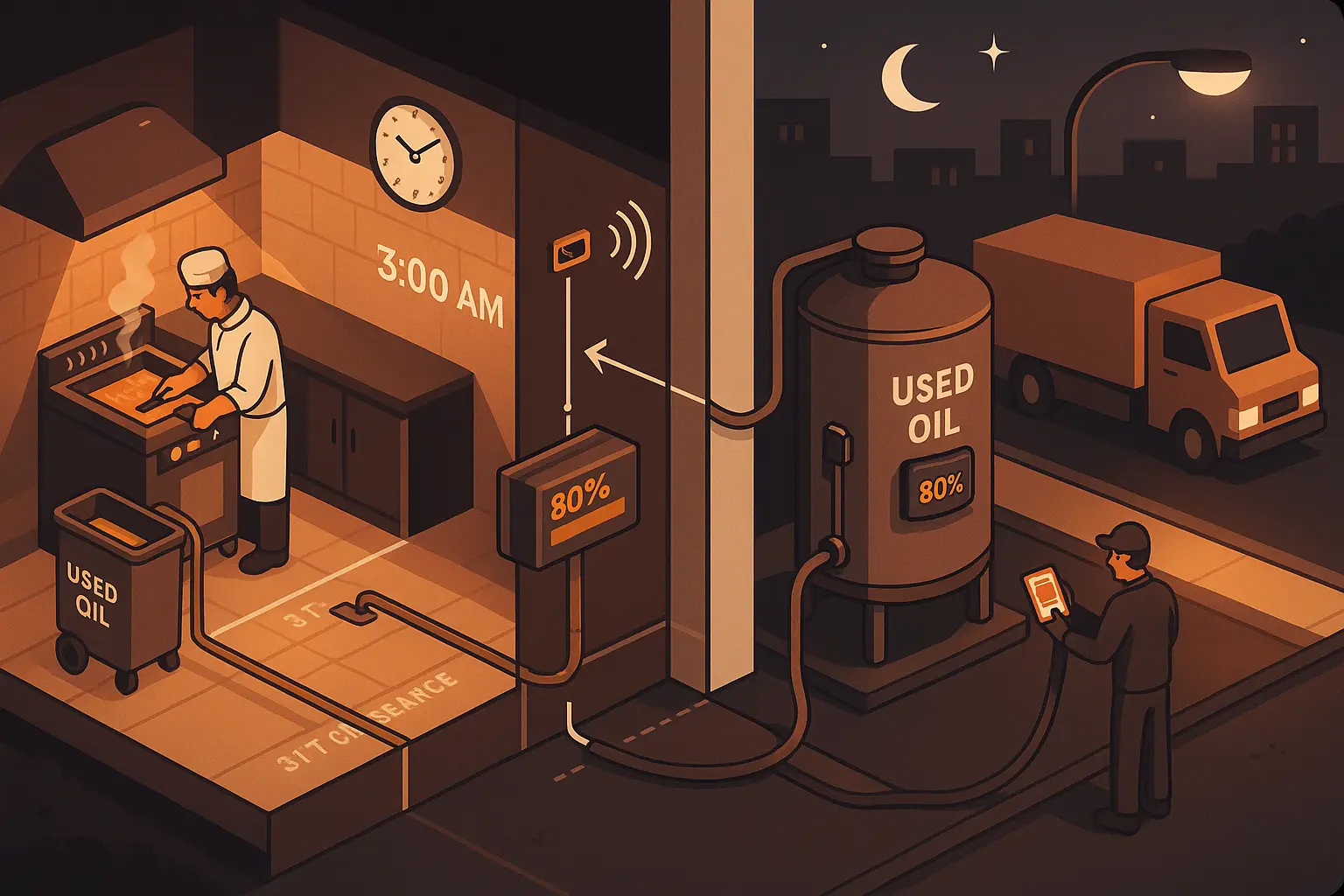Table of Contents
The Fryer Never Sleeps: Why Round the Clock Collection Matters
A fryer running past midnight turns oil from asset to headache fast. Left too long, full tanks invite fires, code fines, and even theft rings that siphon liquid fuel at 3 a.m. Restaurants in tourism hubs report 15 % higher weekend oil output than weekdays, pushing standard “twice a week” pickups past safe fill lines.
Our sensors now text alerts when capacity hits 80 %, letting our used oil collection company arrive before backups spill. Our goal: zero downtime, zero mess, and a paper trail that proves compliance when inspectors arrive unannounced.
Clockwork Pickups: Choosing the Right Frequency
| Service Model | Typical Fill Threshold | Response Time | Best For |
|---|---|---|---|
| Fixed Schedule (2×/wk) | 95 % | Set day / set hour | Small eateries under 150 gal/mo |
| Dynamic Schedule (Sensor Driven) | 80 % | 4 to 12 h | High volume chains |
| On Demand Hotline | 100 % | 2 to 24 h | Seasonal surges & events |
Grease Connections case studies show sensor driven routes cut overflow incidents by 42 % and reduce emergency fees by $200 per call. For nonstop kitchens, dynamic beats fixed because production rarely follows a calendar.
Regional Benchmarks: FL, GA & NJ
- Florida coastal cities: Tourism spikes require three pickups weekly from March to August; daily service for 24 hour diners on Miami Beach.
- Georgia metro hubs: Atlanta stadium events push volumes 30 % above baseline on game days; smart bins auto dispatch within six hours.
- New Jersey corridor: Cold winters thicken oil, slowing drain rates. Regulations allow self transport of <55 gal, but most restaurants exceed that in 48 h.
Plan pickups around these realities, not generic “weekly” promises.
Smart Tanks & Caddies: Equipment That Works While You Cook
| Footprint | Capacity | Ideal Volume (gal/mo) | Hands Free? |
|---|---|---|---|
| 55 gal drum | 55 gal | <150 | No |
| 70 gal wheeled caddy | 70 gal | 150 to 300 | Partial |
| 140 gal upright tank | 140 gal | 300 to 600 | Yes |
| 300 gal enclosed tank | 300 gal | 600 to 1200 | Yes |
| In line vacuum system | Custom | 1200 + | Fully |
According to EPA storage rules, containers must be labeled and in good condition to avoid RCRA penalties. Smart tanks add float sensors that send fill data to a cloud portal, slashing back of house trips and burns.
Sizing Gear for Your Kitchen Footprint
Start with fryer throughput: divide average daily oil change (gal) by desired pickup interval (days). A 50 gal/day kitchen needing three days between pickups needs at least 150 gal of storage plus 20 % headroom, 180 gal total. Fire codes (NFPA 96, 30) also require a 3 ft clearance around combustible equipment. Factor in door widths; 300 gal tanks need a 42 in path. If space is tight, a wheeled caddy feeds a remote outdoor tank through a sealed coupling: no lifting, no spills.
What Bulk Pricing Really Buys You
Used oil rebates for 2025 range from $0.10 to $0.50 per gallon, set by commodity markets and oil quality. Most restaurants still pay small per stop fees ($15 to $40) that cover filtration and transport. Dynamic routing trims those fees by reducing “dry runs,” while steady market demand from renewable diesel producers keeps rebates positive despite oil price swings.
Scenario Snapshot: Real World Cost Math
A Jacksonville sports bar generating 450 gal/month opts for a 140 gal smart tank. With sensor pickups every three days, it receives a $0.28/gal rebate and pays a $20 service fee per stop. Net: +$106/month back to the bar. Swap to daily fixed pickups and the bar would pay $180/month in minimum fees, wiping out its rebate. Numbers vary, but the lesson holds: frequency strategy affects profit more than headline rebate rates.
Compliance & Sustainability: Beyond the Bin
Florida DEP reminds businesses to label “Used Oil” and keep containers under cover to prevent storm water violations. Georgia municipalities add fines for sewer discharge of grease, while New Jersey requires registration for any self transport over 55 gal. Proper chain of custody docs also unlock Low Carbon Fuel Standard credits that raise your rebate without extra work.
Where Grease Connections Leads
Unlike generic vendors that batch stops by zipcode, we dispatch the moment your sensor says 80 %. That slashes overflow risk by 90 % and keeps fryers online, proven across 1400+ high volume kitchens. Our fixed fee model caps charges, while transparent market based rebates ensure you never guess where the money goes. No contracts, no surprise surcharges, just a live dashboard and a 24 hour hotline answered by humans.
Quick Start Checklist & Local Links
- Measure current daily oil output.
- Check clearances for a smart tank upgrade.
- Set pickup alerts at 80 % fill.
- Download compliance labels (free).
- Book a free site plan review → grease collection company.
Your kitchen can be sensor smart by next weekend, schedule a zero pressure call today.









